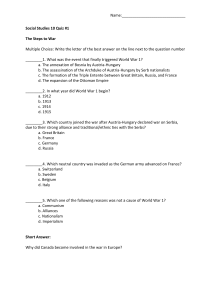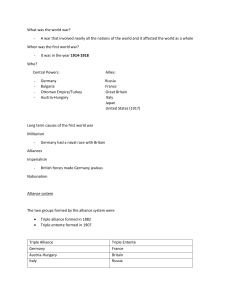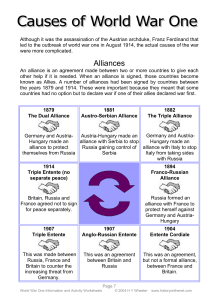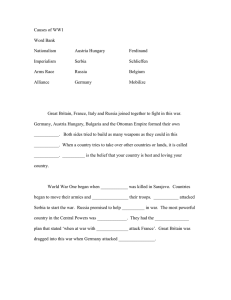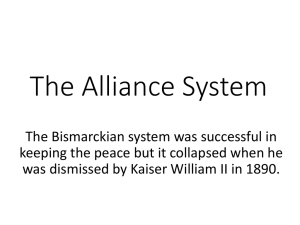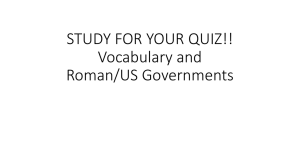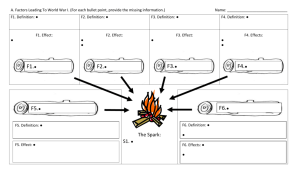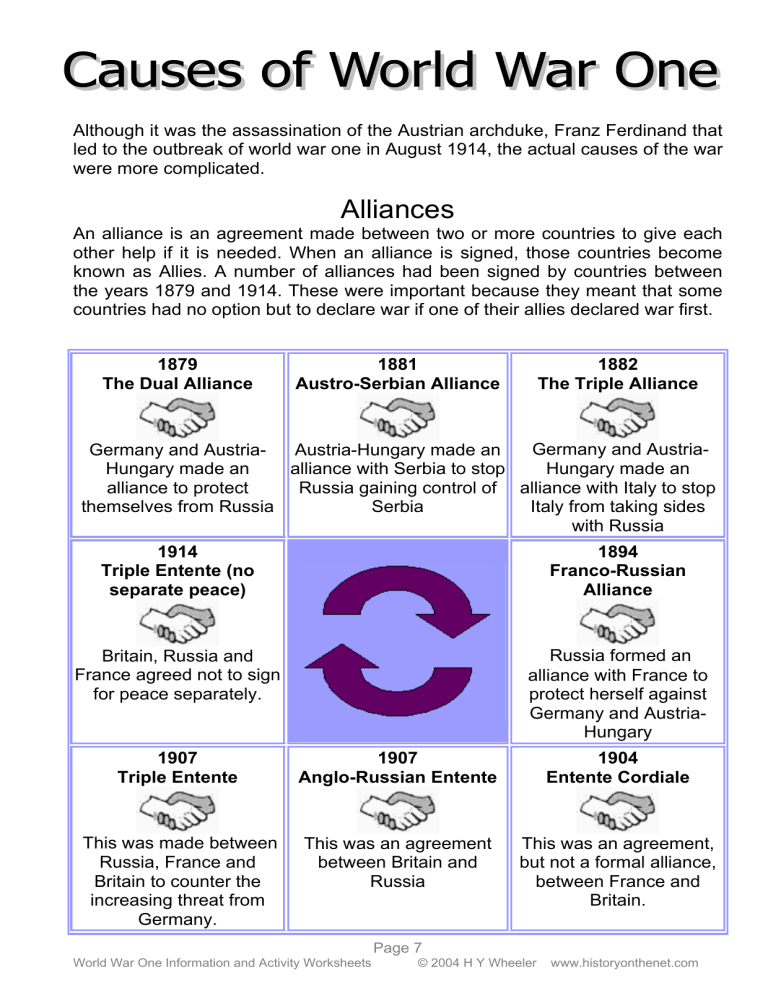
Although it was the assassination of the Austrian archduke, Franz Ferdinand that led to the outbreak of world war one in August 1914, the actual causes of the war were more complicated. Alliances An alliance is an agreement made between two or more countries to give each other help if it is needed. When an alliance is signed, those countries become known as Allies. A number of alliances had been signed by countries between the years 1879 and 1914. These were important because they meant that some countries had no option but to declare war if one of their allies declared war first. 1879 The Dual Alliance 1881 Austro-Serbian Alliance 1882 The Triple Alliance Germany and AustriaGermany and AustriaAustria-Hungary made an Hungary made an alliance with Serbia to stop Hungary made an alliance to protect Russia gaining control of alliance with Italy to stop themselves from Russia Serbia Italy from taking sides with Russia 1914 Triple Entente (no separate peace) 1894 Franco-Russian Alliance Britain, Russia and France agreed not to sign for peace separately. Russia formed an alliance with France to protect herself against Germany and AustriaHungary 1907 Triple Entente 1907 Anglo-Russian Entente 1904 Entente Cordiale This was made between Russia, France and Britain to counter the increasing threat from Germany. This was an agreement between Britain and Russia This was an agreement, but not a formal alliance, between France and Britain. Page 7 World War One Information and Activity Worksheets © 2004 H Y Wheeler www.historyonthenet.com Imperialism Imperialism is when a country takes over new lands or countries and makes them subject to their rule. By 1900 the British Empire extended over five continents and France had control of large areas of Africa. The amount of lands 'owned' by Britain and France increased the rivalry with Germany who had entered the scramble to acquire colonies late and only had small areas of Africa. France had recently been given Morocco by the British. Morocco’s bid for independence was supported by Germany Page 8 World War One Information and Activity Worksheets © 2004 H Y Wheeler www.historyonthenet.com Militarism Militarism means that the army and military forces are given a high profile by the government. Schlieffen’s plan to attack Paris through Belgium The growing European divide had led to an arms race between the main countries. The armies of both France and Germany had more than doubled between 1870 and 1914 and there was fierce competition between Britain and Germany for mastery of the seas. The British had introduced the 'Dreadnought', an effective battleship, in 1906. The Germans soon followed suit introducing their own battleships. The German, Von Schlieffen also drew up a plan of action that involved attacking France through Belgium if Russia made an attack on Germany. Nationalism Nationalism means being a strong supporter of the rights and interests of one's country. The Congress of Vienna, held after the Napoleonic wars left both Germany and Italy as divided states. It was nationalism the reunification of Italy in 1861 and Germany in 1871. France was angry because the settlement at the end of the Franco-Prussian war had given Alsace-Lorraine to Germany. Large areas of both Austria-Hungary and Serbia were home to differing nationalist groups, all of whom wanted freedom from the states in which they lived. There were strong nationalist groups in Bosnia Page 9 World War One Information and Activity Worksheets © 2004 H Y Wheeler www.historyonthenet.com Crises The Moroccan Crisis In 1904 Morocco had been given to France by Britain, but the Moroccans wanted independence and were supported by Germany. War was avoided, but in 1911, the Germans were again protesting against French possession of Morocco. Britain supported France and Germany was persuaded to back down for part of French Congo. The Bosnian Crisis In 1908, Austria-Hungary took over Bosnia. This angered Serbians who felt the province should be theirs. Serbia threatened Austria-Hungary with war, Russia, allied to Serbia, mobilised its forces. Germany, allied to Austria-Hungary mobilised its forces and prepared to threaten Russia. War was avoided when Russia backed down. In 1911 and 1912 there was war in the Balkans when the Balkan states drove Turkey out of the area. The states then fought each other over which area should belong to which state. Austria-Hungary intervened and forced Serbia to give up land. Tension between Serbia and Austria-Hungary was high. Page 10 World War One Information and Activity Worksheets © 2004 H Y Wheeler www.historyonthenet.com
